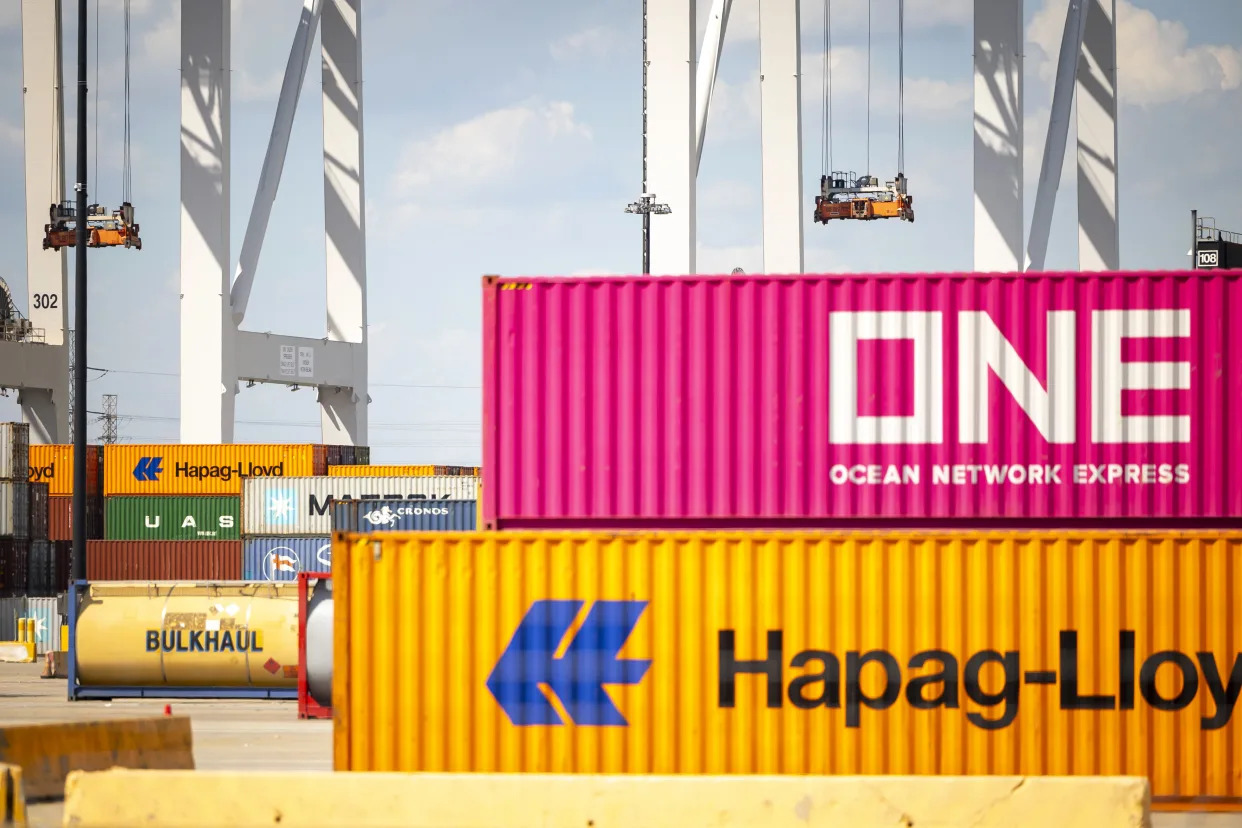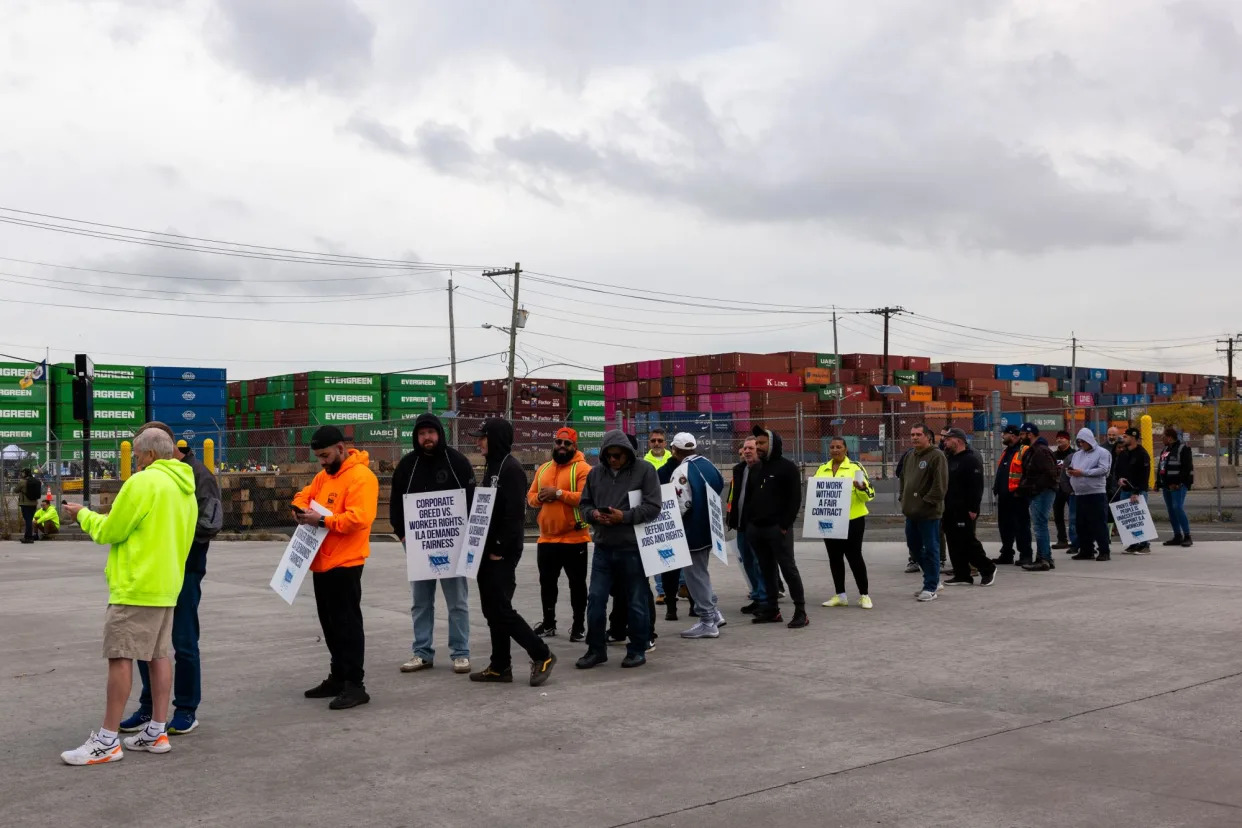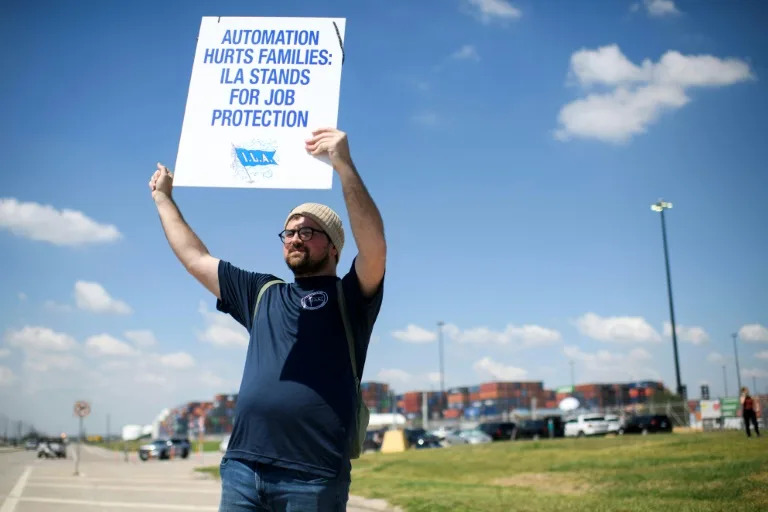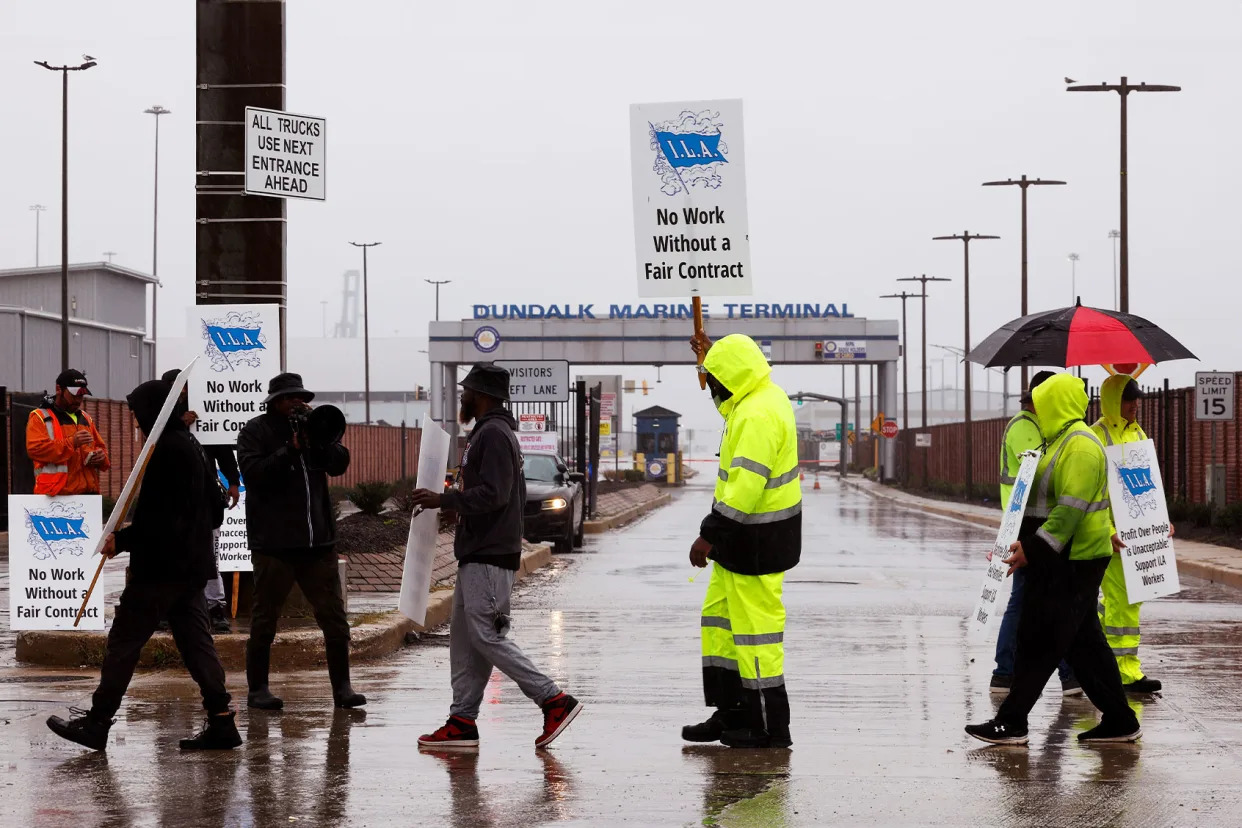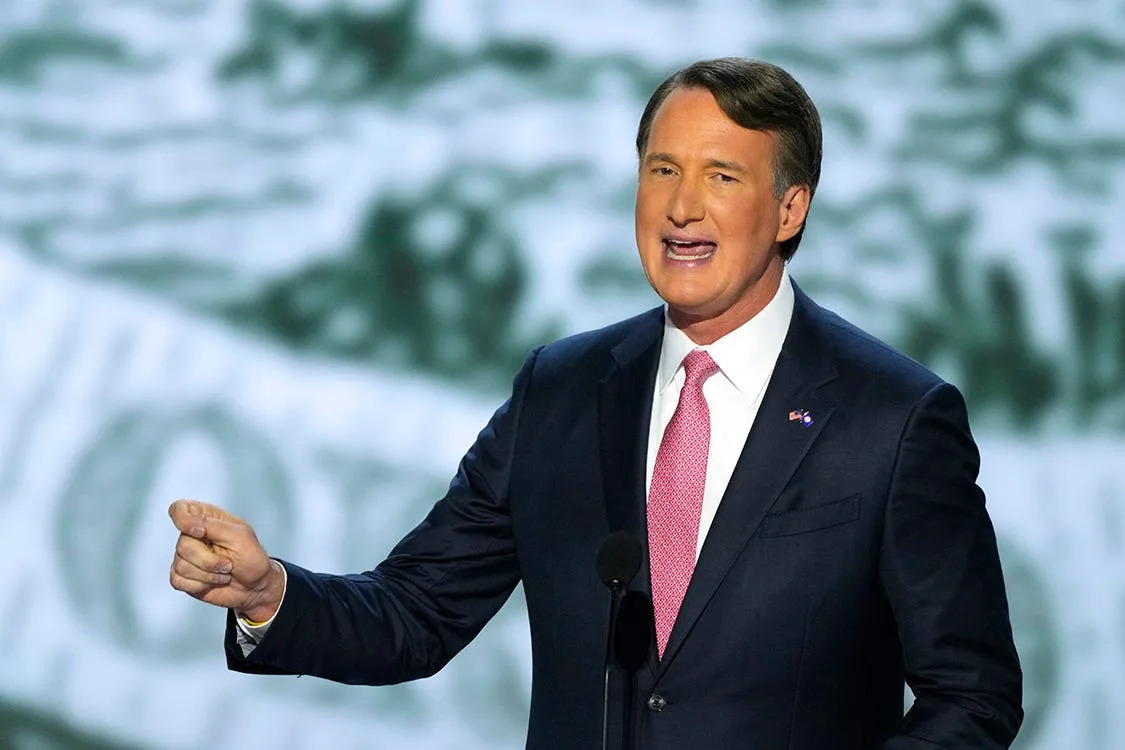Shipping companies 'raking in record profits' and not sharing with striking workers: Biden
At midnight on Tuesday morning, the International Longshoreman's Association (ILA) went on strike, meaning tens of thousands of port workers are now walking off the job in protest of their employers refusing to meet their demands.
The Associated Press (AP) reported that the ILA's unionized workforce of approximately 45,000 port workers had promised to strike without a new contract that guaranteed workers higher wages and a promise to not automate their jobs. The strike is the ILA's first in 47 years, and affects 36 ports across the country from Maine to Texas.
Now, President Joe Biden is openly siding with the striking workers, and called out the greed of shipping companies in a public statement issued on Tuesday. HuffPost reporter Sam Stein observed that the White House's position is "heavily in favor" of the striking longshoremen.
READ MORE: Brown bananas, crowded ports, empty shelves: What to expect if there's a big dockworkers strike in the US
"Collective bargaining is the best way for workers to get the pay and benefits they deserve. I have urged USMX, which represents a group of foreign-owned carriers, to come to the table and present a fair offer to the workers of the International Longshoremen’s Association that ensures they are paid appropriately in line with their invaluable contributions," Biden stated.
"Ocean carriers have made record profits since the pandemic and in some cases profits grew in excess of 800 percent compared to their profits prior to the pandemic," he continued. "Executive compensation has grown in line with those profits and profits have been returned to shareholders at record rates. It’s only fair that workers, who put themselves at risk during the pandemic to keep ports open, see a meaningful increase in their wages as well."
Related video: Half of U.S. ocean shipping operations have halted (FOX 4 Dallas-Fort Worth)
The president's reminder of the shipping companies' post-pandemic profits is similar to a previous statement by Sen. Bernie Sanders (I-Vermont), who has long been an outspoken proponent of organized labor and critic of corporate greed. After Biden said he would not be invoking the Taft-Hartley Act of 1947 to break the strike, Sanders praised Biden's commitment to workers' right to strike.
"Dock workers are striking against excessive corporate greed. The shipping industry has made $400 billion in profits since 2020," the Vermont senator tweeted. "It's time for dock workers to be treated with respect, not contempt."
Biden further excoriated the shipping companies for their greed in the wake of Hurricane Helene, which made landfall over the weekend as a category 4 storm and severely impacted infrastructure in several states. He noted that dockworkers having the contract they need is critical for disaster relief.
"As our nation climbs out of the aftermath of Hurricane Helene, dockworkers will play an essential role in getting communities the resources they need. Now is not the time for ocean carriers to refuse to negotiate a fair wage for these essential workers while raking in record profits," Biden stated. "My Administration will be monitoring for any price gouging activity that benefits foreign ocean carriers, including those on the USMX board."
The AP reported that despite the strike, consumers will likely be minimally affected despite the upcoming holiday season. Logistics experts told the outlet that shipping companies anticipated a strike and as a result, retailers are fully stocked on most goods throughout the holiday season. However, some fresh produce items like bananas will likely not be on shelves, with most coming into affected ports from Ecuador, Guatemala and Costa Rica.
Click here to read Biden's full statement on Whitehouse.gov.
Some carriers' profits rose more than 800% after the pandemic, the president said

Striking members of the International Longshoremen's Association picket at the Red Hook Container Terminal in Brooklyn, N.Y., on Tuesday, Oct. 1, 2024.
President Joe Biden called Tuesday for shipping companies to share some of their record profits and give striking dockworkers a "fair wage" — while also warning them against price gouging during the work stoppage.
In a prepared statement released by the White House, Biden said some ocean carriers saw their profits skyrocket more than 800% after the COVID-19 pandemic compared to what they made before.
"Executive compensation has grown in line with those profits and profits have been returned to shareholders at record rates," Biden said. "It's only fair that workers, who put themselves at risk during the pandemic to keep ports open, see a meaningful increase in their wages as well."
About 45,000 dockworkers at 36 ports along the East and Gulf coasts walked off the job after their contract expired at the end of Monday, marking the first strike since 1977 by their union, the International Longshoremen's Association.
The move came little more than a month before the presidential election, and its impact on the economy could pose a problem for Vice President Kamala Harris, who's locked in a tight race against former President Donald Trump.
Biden — the self-proclaimed "most pro-union president" in U.S history — said the dockworkers were needed to help communities recover from the devastation of Hurricane Helene, which Moody's has projected could cost as much as $34 billion in property damage and lost economic output, Investor's Business Daily reported Tuesday.
"Now is not the time for ocean carriers to refuse to negotiate a fair wage for these essential workers while raking in record profits," Biden said.
Biden also cautioned that his administration "will be monitoring for any price gouging activity that benefits foreign ocean carriers," including members of the United States Maritime Alliance (USMX).
The USMX, which represents shipping companies and port associations, said Monday evening that it offered to raise the salaries of dockworkers by 50% over six years and keep contractual limits on automation that could eliminate jobs, according to the Associated Press.
On Tuesday, the president of the International Longshoremen's Association told CNBC that the union wanted raises of 61.5%, down from 77%, in addition to a complete ban on automation, AP said.
Union members now earn a base salary of about $81,000 a year but overtime can push that past $200,000, according to AP.
Lian Kit Wee
BUSINESS INSIDER
President Joe Biden called for port companies to offer fair deals to striking dockworkers.
The transportation secretary, Pete Buttigieg, warned against exploiting the strike for profit.
He and the acting labor secretary, Julie Su, urged dock workers and companies to negotiate.
President Joe Biden and other government officials are urging port companies to offer stronger contracts to the 45,000 dockworkers on strike at East and Gulf Coast ports.
They're intervening because of the strike's huge economic stakes. It shut down 36 ports, and JPMorgan analysts have said it could put a $5 billion dent in the economy per day.
The message from the Biden administration is clear: Companies need to offer a fair deal to the striking workers as soon as possible.
In a Tuesday post on X, Biden pushed for ocean carrier companies to offer "a strong and fair contract" that reflects workers' contribution to the economy since the pandemic and to these companies' record profits.
Biden added that his team was actively monitoring for price gouging by foreign ocean carriers.
"No company should exploit this for profit," he said.
In a Tuesday statement, the transportation secretary, Pete Buttigieg, also warned companies against profiteering from the strikes and called on them to remove any surcharges that may unfairly burden consumers or businesses.
"No one should exploit a disruption for profit, especially at a time when whole regions of the country are recovering from Hurricane Helene," Buttigieg said.
He also said the Federal Maritime Commission had been tasked with ensuring that all fees imposed during this period were "legitimate and lawful."
Buttigieg said in an Instagram post on Tuesday that he'd been in contact with supply-chain partners for months, and he urged all parties to "come to terms in good faith, fairly, and quickly."
The acting labor secretary, Julie Su, said in a Tuesday statement that she'd also been in talks with dockworkers and port operators, encouraging the groups to return to the bargaining table and "reach a fair contract."
Su said the port workers' sacrifices and importance during the pandemic and in helping communities recover from Hurricane Helene weren't fairly reflected in their salaries.
"As companies make record profits, their workers should share in that economic success," Su said in a Wednesday post on X.
Negotiations showed little movement until just before the strike began. The US Maritime Alliance, representing the ports, offered employees a 50% wage increase over six years.
Though the International Longshoremen's Association, representing thousands of dockworkers, briefly indicated a willingness to accept 61.5%, it has since reaffirmed its demand for a 77% rise over six years, the Associated Press reported Wednesday.
Despite calls from retailers and manufacturers to use federal powers to intervene and stop the strike, Biden has so far resisted invoking the Taft-Hartley Act, which would allow the government to force an end to the strike.
In a Tuesday statement, Biden said he remained committed to collective bargaining and called on the USMX to negotiate a stronger contract for dockworkers.
The White House, Department of Labor, and Department of Transportation didn't respond to requests for comment sent by Business Insider outside business hours.
Strike – the first by port workers on US east coast since 1977 – threatens to shut down ports from Maine to Texas
Michael Sainato
Joe Biden has urged port operators to give workers a “meaningful increase” in pay after tens of thousands went on strike, prompting some of the busiest ports in the US to brace for crippling disruption.
About 45,000 port workers represented by the International Longshoremen’s Association (ILA) began walking off the job after their contracts expired at midnight, with 36 ports along the east and Gulf coasts affected. They typically handle about half of the nation’s ocean shipping.
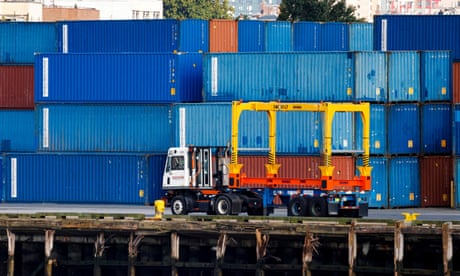
Strike looms at busiest US ports as 45,000 workers prepare to walk off job
Read more
Talks over a new contract between the ILA and the United States Maritime Alliance (USMX) have broken down, and the union dismissed a last-ditch offer from operators hours before the strike was due to began.
Hours after the strike began, the White House issued a robust statement calling on USMX to negotiate a “fair” contract that reflects “the substantial contribution” of ports workers to America’s economy.
“Now is not the time for ocean carriers to refuse to negotiate a fair wage for these essential workers while raking in record profits,” the US president said. “My administration will be monitoring for any price-gouging activity that benefits foreign ocean carriers, including those on the USMX board.”
The strike – the first by port workers on the US east coast since 1977 – threatens to shut down ports from Maine to Texas, mangling supply chains and straining the US economy.
As workers joined picket lines at ports including Philadelphia, Houston and Virginia in the early hours, economists have warned that failure to end the strike swiftly could lead to shortages and higher prices.
Ocean carriers have enjoyed “record profits” since the pandemic, Biden added, “and in some cases profits grew in excess of 800% compared to their profits prior to the pandemic. Executive compensation has grown in line with those profits and profits have been returned to shareholders at record rates.
“It’s only fair that workers, who put themselves at risk during the pandemic to keep ports open, see a meaningful increase in their wages as well.”
Negotiators on both sides of the table have accused the other of refusing to bargain. The ILA has argued that USMX, which represents 40 ocean terminals and port operators, has “low-balled” offers on wage raises for workers and accused it of violating the previous contract by introducing automation at several US ports.
It is estimated the strike will cost the economy as much as $5bn a day. The union has said it will still handle military cargo, and that passenger cruise ships will be unaffected.
In a statement issued after Biden’s intervention on Tuesday, port operators said they were “proud” of the pay and benefits offered to their employees.
“We have demonstrated a commitment to doing our part to end the completely avoidable ILA strike,” USMX said, arguing that its latest proposed wage increase “exceeds every other recent union settlement” and addresses inflation. “We look forward to hearing from the Union about how we can return to the table and actually bargain, which is the only way to reach a resolution.”
In Philadelphia, the local ILA president, Boise Butler, said the union would strike for as long as it needed to get a fair deal, and claimed that it had leverage over the companies. “This is not something that you start and you stop,” he told Associated Press. “We’re not weak,” he added, pointing to the union’s importance to the nation’s economy.
Shipping companies made billions of dollars during the pandemic by charging high prices, and “now we want them to pay back”, Butler added. “They’re going to pay back.”
USMX filed an unfair labor practice charge against the union with the National Labor Relations Board last Wednesday, alleging the union was refusing to negotiate. Before the strike on Monday, USMX said it and the union had exchanged new offers on wages. The union countered by claiming the charge was a “publicity stunt”.
Current wages under the contract that expired on Monday range from $20 an hour to the top wage of $39 an hour. The union is seeking raises of 77% over the six-year contract, to a top rate of $69 an hour by 2030.
The Transportation Trades Department (TTD) of the AFL-CIO, the largest federation of labor unions in the US, issued a statement before the strike in support of the union.
“Let us be clear: the employers, not the workers, have shirked their responsibility and punted labor negotiations to the 11th hour, when the damage to the public and the national supply chain would be most detrimental,” said Greg Regan and Shari Semelsberger, president and secretary-treasurer of TTD. “While USMX seeks to cast blame on the frontline workers who move our supply chain, they are at fault.”
Published Oct 01, 2024
US News Reporter
The International Brotherhood of Teamsters slammed the Biden-Harris administration, saying it should "stay the f*** out of this fight" as port workers began a strike.
Just past midnight on October 1, unionized port workers from Maine to Texas walked off the job after no deal was reached regarding a new master contract between the International Longshoremen's Association (ILA) union and the United States Maritime Alliance (USMX), which represents employers of the East and Gulf Coast longshore industry. It is the first strike among port workers since 1997.
In response to the failed negotiations, Teamsters, which represents more than a million workers across the U.S. and Canada, said it stands "in full solidarity with the International Longshoremen's Association as they fight for a fair and just contract with the ocean carriers represented by USMX."
"The U.S. government should stay the f*** out of this fight and allow union workers to withhold their labor for the wages and benefits they have earned," the union said in a press release issued on September 30. "Any workers—on the road, in the ports, in the air—should be able to fight for a better life free of government interference. Corporations for too long have been able to rely on political puppets to help them strip working people of their inherent leverage."
 A container ship departs the Port of Newark for the Atlantic Ocean on September 30, 2024. Unionized port workers from Maine to Texas have walked off the job. Spencer Platt/GETTY
A container ship departs the Port of Newark for the Atlantic Ocean on September 30, 2024. Unionized port workers from Maine to Texas have walked off the job. Spencer Platt/GETTYNewsweek contacted the White House for comment on the Teamster's statement via email outside of standard working hours.
President Biden previously confirmed the federal government would not be taking action to prevent the walkout. A strike could be mitigated for a stretch by the president invoking the Taft-Hartley Act, which allows the government to intervene in any labor dispute that could threaten national security or safety by imposing an 80-day cooling-off period. This period would force workers back on the job as negotiations proceed.
"We've never invoked Taft-Hartley to break a strike and are not considering doing so now," a Biden administration official told Reuters. "We encourage all parties to remain at the bargaining table and negotiate in good faith."
"President Biden and Vice President Harris are closely monitoring the strike at East Coast and Gulf Coast ports," the White House said in a statement issued on October 1. "Senior White House and Administration officials continue to work around the clock to get both sides to continue negotiating towards a resolution. The President and Vice President believe collective bargaining is the best way for both American workers and employers to come to a fair agreement."
Why Are Port Workers Striking?
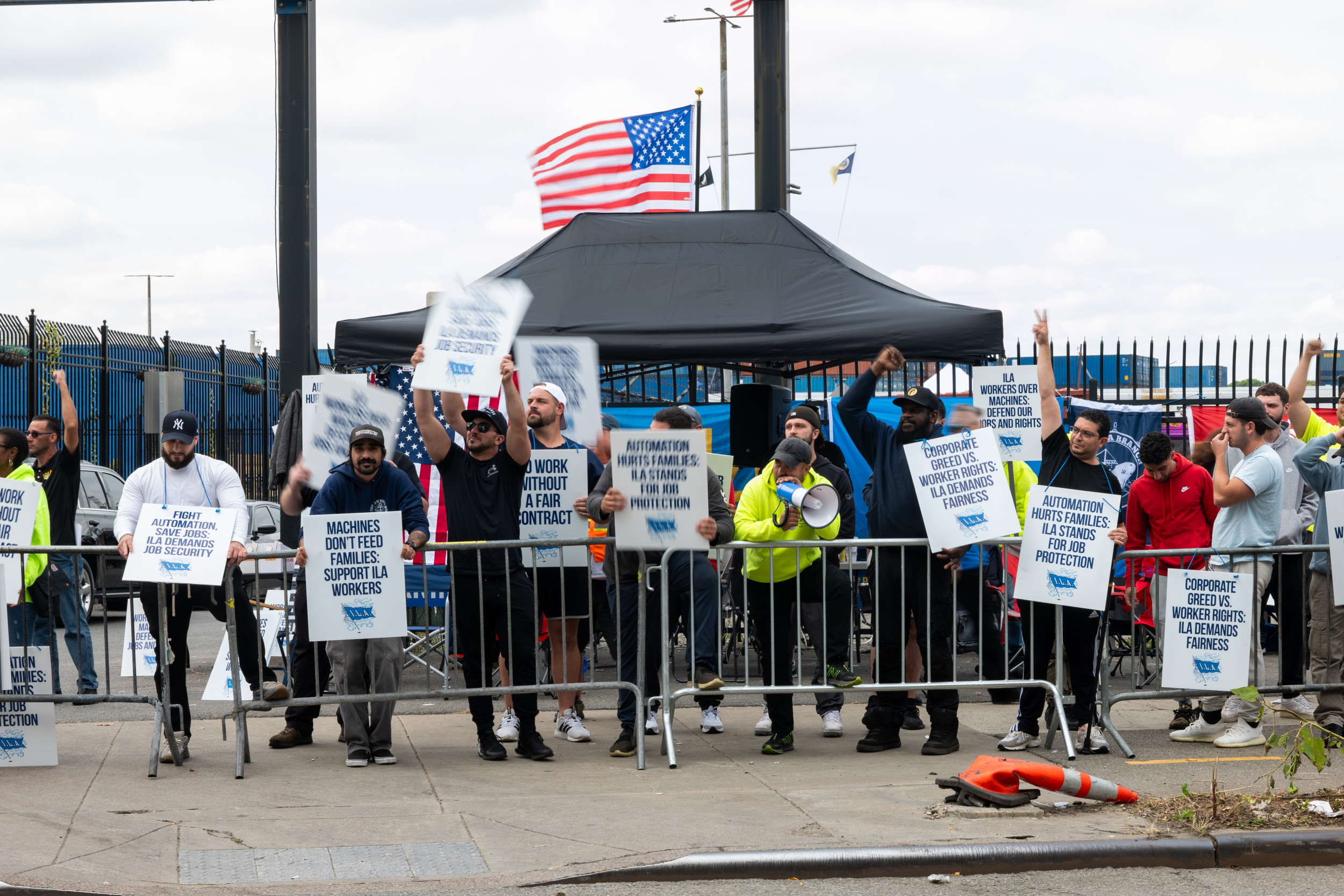
While negotiations between the ILA—which represents approximately 45,000 port workers at 36 locations across the East and Gulf coasts—and USMX made some progress regarding pay on Tuesday, the ILA said it rejected the alliance's latest proposal as it fell short of what "rank-and-file members are demanding in wages and protections against automation."
"We are prepared to fight as long as necessary, to stay out on strike for whatever period of time it takes, to get the wages and protections against automation our ILA members deserve," ILA president Harold Daggett said. "They must now meet our demands for this strike to end."
While Teamsters has previously endorsed a number of Democratic candidates during past election cycles, including Joe Biden in 2020, it has said it will not do the same for the party's 2024 nominee, Kamala Harris, after its members were divided on who to support in the November presidential election.
"President Joe Biden won the support of Teamsters voting in straw polls at local unions between April-July prior to his exit from the race," the union said in a statement in September. "But in independent electronic and phone polling from July-September, a majority of voting members twice selected Trump for a possible Teamsters endorsement over Harris."
"The union's extensive member polling showed no majority support for Vice President Harris and no universal support among the membership for President Trump."
Story by Taylor Herzlich
• 10/01/24
President Biden on Tuesday night backed union dockworkers and pressured US port employers to put forward a “fair contract” ahead of the second day of historic port strikes.
Some 45,000 members of the International Longshoremen’s Association walked off the job on Tuesday – picketing at ports stretching from Maine to Texas as they fight for higher wages and protections from automation to be included in their new contract.
“Foreign ocean carriers have made record profits since the pandemic, when Longshoremen put themselves at risk to keep ports open,” Biden said in a post on X.

President Joe Biden on Tuesday night backed union dockworkers and pressured port employers to put forward a ‘fair contract.’ AP
“It’s time those ocean carriers offered a strong and fair contract that reflects ILA workers’ contribution to our economy and to their record profits.”
Analysts warn the strike could cost the economy billions of dollars a day as food, automobile, pharmaceutical and other goods shipments stall.
Biden instructed his team to monitor for potential price gouging activity that benefits foreign ocean carriers, the White House said.
Retailers, auto suppliers and produce importers had hoped Biden would impose the federal Taft-Hartley Act, which allows US presidents to enact an 80-day cooling-off period that forces employees to return to work during certain labor disputes.
Republican representatives Sam Graves and Daniel Webster – both chairs of transportation committees – asked Biden on Tuesday to invoke the Taft-Hartley Act.
But those hopes were swept away when Biden said Monday that he does not “believe” in Taft-Hartley.
Foreign ocean carriers have made record profits since the pandemic, when Longshoremen put themselves at risk to keep ports open.
It’s time those ocean carriers offered a strong and fair contract that reflects ILA workers’ contribution to our economy and to their record profits.
Harold Daggett – the fiery, outspoken union boss leading the strikes – had mocked the idea during an interview in early September.
“Do you think when I go back for 90 days those men are gonna go to work on that pier?” Daggett said.
The United States Maritime Alliance had offered the union a 50% wage hike in its new six-year contract – but Daggett said the union is pushing for more.

Harold Daggett (above) — the fiery union boss leading the strikes — mocked the idea of Biden invoking the Taft-Hartley Act. AFP via Getty Images
Daggett – who raked in $728,000 in compensation last year from the ILA – said the union is seeking a $5 per hour raise for each year of the six-year contract and a promise to prohibit automation.
“We are prepared to fight as long as necessary, to stay out on strike for whatever period of time it takes, to get the wages and protections against automation our ILA members deserve,” Daggett said on Tuesday.
The widespread picketing represents the ILA’s first major strike since 1977.

Daggett said the union is seeking a $5 per hour raise for each year of the six-year contract, as well as protections from automation. Bloomberg via Getty Images
The strike comes soon after Hurricane Helene wreaked devastation across the Southeastern states and ahead of the holiday shopping season.
About half of US imports arrive via water, according to Morgan Stanley.
If the strike persists, it could slam the US economy – costing it as much as $5 billion a day, JP Morgan analysts estimated.
The port logjams could result in supply chain disruptions, food shortages and price hikes akin to the economic turmoil seen during the pandemic.
White House Meets with Terminal Operators Ahead of Looming ILA Strike
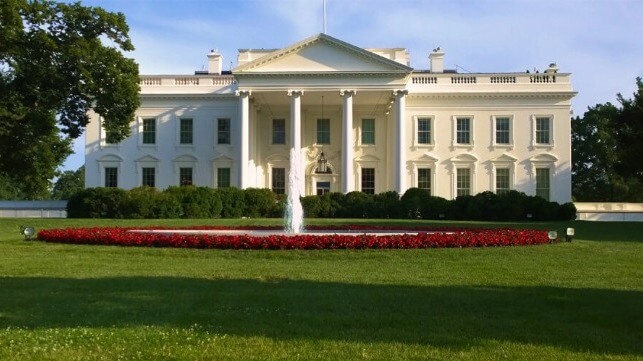
Going into the final weekend before the threatened strike that would stop container and RoRo operations at 36 U.S. ports, the White House summoned representatives of the terminal operators and employers to a meeting. In the official readout on the meeting, the White House said that it had a similar conversation with the leaders of the International Longshoremen’s Association during the week.
The official report said that the meeting was headed up by Transportation Secretary Pete Buttigieg, Acting Labor Secretary Julie Su, and top White House economic adviser Lael Brainard. They were reported to be meeting with the U.S. Maritime Alliance officials although it did not specify which executives were representing the organization. USMX’s membership consists of container carriers, terminal operators, and port associations.
The meeting comes as the employers and union remain at a deadlock and have not had formal negotiating sessions for the master contract that covers approximately 45,000 longshore workers at ports from Maine to Florida and along the U.S. Gulf Coast. USMX acknowledged earlier in the week that it had received outreach from the federal government while saying the ILA continued to refuse to resume negotiations. USMX failed an “unfair labor” notice seeking the government to compel the ILA leadership to negotiate.
In the war of words being played out in statements, the leadership of the ILA said there had been contact between the sides but called the wage proposals from the employers “unacceptable.” They said the employers were unfair in the low wage offer. Automation issues are not being mentioned but are reported to be a major element of the new contract with the ILA saying it rejects all automation or semi-automation as a job killer.
White House officials confirmed today’s meeting as well as the messages with the ILA without providing any details. They said they were conveying directly "that they need to be at the table and negotiating in good faith fairly and quickly."
Unidentified individuals from the Biden administration previously said they had not moved in the nearly four years of the presidency to break a union strike and it was not their intent now. They believe disputes need to be settled by negotiation, but also are closely looking at the current situation and the ramifications for the supply chain and the economy. Last year, Jule Su was credited as being instrumental in driving the contract agreement between the West Coast employers represented by the Pacific Maritime Association and the International Longshore and Warehouse Union.
Analysts point out that the White House has few options especially just weeks before the presidential elections. Trade organizations and elected officials are all pressuring the administration to intervene. It could invoke the Taft-Hartley Act which would mandate a cooling off period and negotiations. Short of that, its only option is outreach and cajoling the two sides back to the negotiating table.
The six-year contract is ticking down due to expire at midnight on September 30 with the ILA saying it will not extend past the deadline. The union has been preparing for a long time for what its leadership has called “the biggest battle the ILA has faced in 47 years.” The last strike was in 1977 and lasted 44 days.
Biden Rules Out Intervening In Looming
Dockworkers Strike
By AFP - Agence France Presse
US President Joe Biden on Sunday said he would not intervene in labor negotiations involving thousands of dockworkers on the verge of a strike which could shut down major ports and snarl US trade.
The president was traveling back to Washington from Delaware when he was asked by reporters if he would get involved in the dispute, to which he said "no," because of "collective bargaining."
The International Longshoremen's Association (ILA), which represents 85,000 dockworkers among 36 US ports, has been in contract negotiations since May which have stalled in recent weeks.
The union plans for workers "at all Atlantic and Gulf Coast ports" to walkout at midnight on Tuesday if a new contract is not agreed upon by then with the United States Maritime Alliance (USMX), which represents shipping companies and terminal operators.
"USMX refuses to address a half-century of wage subjugation where Ocean Carriers profits skyrocketed from millions to mega-billion dollars, while ILA longshore wages remained flat," the union said Sunday in a statement.
The walkout would affect 14 large ports along the country's eastern and southern coast but would not affect western ports.
Biden styles himself as one of the most "pro-union" presidents in US history.
